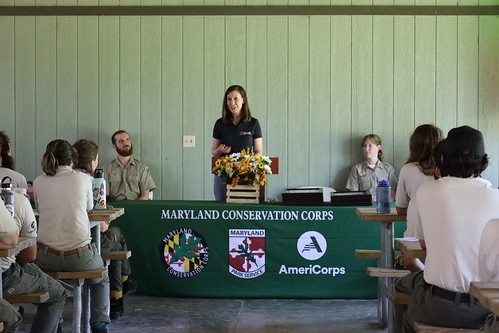 Every summer since I have been Secretary, I have been proud to share with you excerpts from the Maryland Department of Natural Resources Annual Report. We have long produced this document highlighting the achievements of our multiple operating units during the previous year in an effort to keep you informed of our activities. Since 2019, the 50th anniversary of our department, we have also made it a feature of this magazine.
Every summer since I have been Secretary, I have been proud to share with you excerpts from the Maryland Department of Natural Resources Annual Report. We have long produced this document highlighting the achievements of our multiple operating units during the previous year in an effort to keep you informed of our activities. Since 2019, the 50th anniversary of our department, we have also made it a feature of this magazine.As is the case in any organization, when you take the time to sit back and reflect on the previous year, you realize what a positive difference our staff makes in Maryland every day along with our partners and our volunteers. I encourage you to read the excerpts of our annual report or view the full report on the DNR website.
We also track our progress on restoring the Chesapeake Bay very closely, specifically removal of nutrient pollution and sediment from the water. Through investments in best management practices, nature-based solutions, and emerging technologies, our Chesapeake and Atlantic Coastal Bays Trust Fund reduced over 3.1 million pounds of nitrogen; over 24,000 pounds of phosphorus; and nearly 7,400 tons of suspended solids from reaching our waters. Our Grants Gateway is currently open for applications for the next round of projects to be funded in Fiscal Year 2024.
Looking toward the future, we will need skilled workers and critical thinkers to address our natural resources challenges. That is why one of my favorite programs within DNR is our conservation corps. These important programs provide workforce and leadership training to youth and veterans, which is important not just for our department, but for the future of our state.
I was recently honored to attend the graduation of 35 members of the 2021-2022 Maryland Conservation Corps (MCC) after they completed 10 months of job training, conservation work, and stewardship with the Maryland Park Service.

Members who are ages 17 through 25 complete at least 1,700 hours of service ranging from invasive species management and trail improvements to guided hikes and environmental education. In addition, these crews stepped up to the plate to assist with cleaning up after severe storm damage at several of our state parks this year.
An important parallel program of the MCC is the Conservation Jobs Corps (CJC), a summer program that teaches important outdoor job skills through work on our public lands, often in close conjunction with MCC. More than three dozen young Marylanders ages 14-17 also celebrated their graduation from the Conservation Jobs Corps after five weeks of job training, conservation education, hard work, and fun. Their projects included native tree and pollinator garden plantings, invasive plant removal, and trail construction and maintenance projects.
For returning veterans, the Veterans Conservation Corps (VCC) empowers and engages them in conservation service work on public lands. The VCC’s work in state parks uses veterans’ unique background, diverse job skills, and service ethic to address pressing conservation needs on public lands. The focus of the VCC is to develop veterans professionally through training and on-the-job experience through full-time, paid, year-round positions.
These are a few of the activities that represent our past, present, and future commitment to Maryland.
We are grateful to everyone who practices responsible use of our natural resources and contributes to the protection of Maryland’s lands and waterways—including you!
Jeannie Haddaway-Riccio, Secretary
Article appears in Vol. 25, No. 3 of the Maryland Natural Resource magazine.
